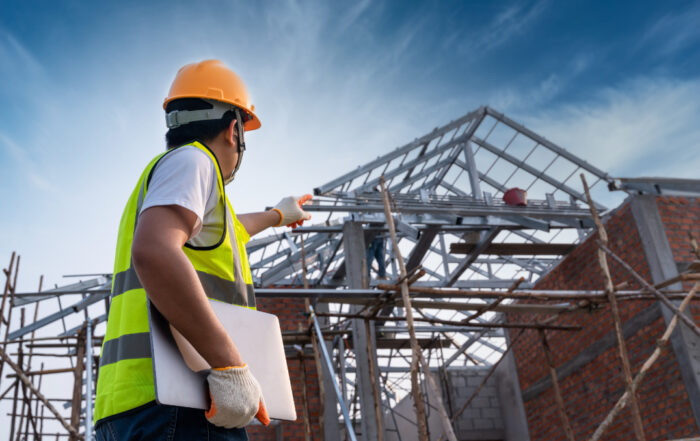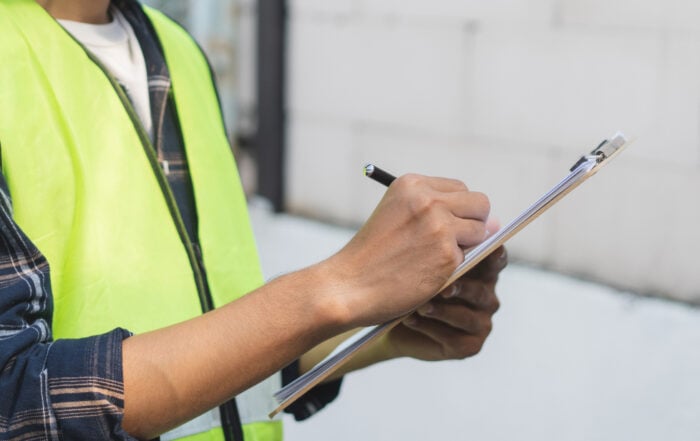In the world of new construction projects, the inspection process is a critical phase often overlooked. These careful examinations are the foundation of quality assurance, safety validation, and adherence to regulatory standards.
Foundation and Footing Inspection
Its foundation must be sound before a new construction project can truly take shape. Foundation and footing inspections encompass the initial stages of construction, primarily focusing on excavation and foundation layout. This meticulous examination validates the accuracy of depth, width, and reinforcement, essential components that provide stability and prevent structural failures. Moreover, potential soil and drainage concerns are identified, preempting potential hazards that could arise in the future.
Excavation and Layout Verification
The initial step involves verifying that the excavation has been carried out accurately according to the architectural plans. This includes ensuring that the depth and width of the excavation match the design specifications. Any deviations from the planned dimensions could lead to issues in the structural integrity of the building.
Reinforcement Verification
The reinforcement within the foundation, often in the form of steel bars or mesh, is crucial for providing strength to the concrete and preventing cracks. Inspectors ensure that the reinforcement’s placement, spacing, and quality comply with engineering standards. This is essential to ensure the foundation can withstand load and environmental stresses.
Soil and Drainage Assessment
The soil type and quality on which the foundation is built can significantly impact its stability. Inspectors assess the soil’s bearing capacity to ensure it can support the structure’s weight. Additionally, they identify potential soil-related issues, such as expansive soils that can lead to foundation movement. Proper drainage considerations are also important to prevent water accumulation around the foundation, which could lead to erosion or water damage.
Compaction Testing
Proper soil compaction before pouring the foundation is crucial to prevent settling and subsequent structural issues. Inspectors might conduct tests to ensure the soil has been adequately compacted, meeting the required density levels.
Framing Inspection
The structural integrity of a building hinges upon the precision of its framing. Framing inspections delve into the heart of the framework, encompassing walls, floors, and the roof. Careful assessment verifies that measurements are precise, spacing is optimal, and every element adheres to meticulous building codes and engineering blueprints. This stage serves as a safeguard against deviations that might compromise the stability and safety of the structure.
Electrical Inspection
Electrical systems are essential in an age driven by technology and power. Electrical inspections thoroughly examine wiring, outlets, and the entire electrical network. Beyond mere functionality, these assessments encompass grounding, ensuring protective mechanisms are in place to prevent electrical mishaps. Rigid adherence to electrical codes and safety standards is essential, guaranteeing future occupants’ safety.
Plumbing Inspection
Water is life, and plumbing is the circulatory system that sustains it in a constructed space. Plumbing inspections meticulously review pipes, plumbing lines, and fixtures. The aim is twofold: to detect leaks, improper connections, or potential issues and ensure that water pressure remains consistent. Compliance with plumbing codes and regulations is carefully checked to prevent future inconveniences.
HVAC Inspection
Comfort within a constructed space is intricately tied to its heating, ventilation, and air conditioning systems. HVAC inspections meticulously evaluate these systems, testing their functionality, energy efficiency, and air quality they provide. Striving for the perfect balance between comfort and conservation, these inspections also encompass adherence to HVAC codes and industry guidelines, optimizing the overall living or working environment.
Insulation and Energy Efficiency Inspection
Efficiency in construction is not merely about aesthetics; it’s about sustainable living and resource conservation. Insulation and energy efficiency inspections investigate installing insulation within walls, floors, and ceilings. By validating the use of energy-efficient materials and techniques, these inspections foster both comfortable and eco-conscious environments, aligning the construction with modern-day energy efficiency standards.
Final Walkthrough of a New Construction Inspection
The culmination of construction is marked by a final walkthrough inspection, a comprehensive evaluation that symbolizes the transition from the building phase to occupancy. Every aspect of the construction is reviewed meticulously, leaving no stone unturned. Remaining defects or issues are identified, allowing for rectification before the structure is deemed ready for habitation. This stage is crucial in ensuring the construction journey ends on a high note, with a space meeting the highest quality standards.
In conclusion, the various types of new construction inspections form an intricate web of checks and balances, ensuring that every phase of the construction journey is accounted for. From the foundation to the final walkthrough, each inspection is a guardian of quality, safety, and adherence to regulations. Through these vigilant assessments, the world of construction transforms from a blueprint into a reality that can be inhabited with confidence and peace of mind.
Why Choose Erie Inspection Service?
Our friendly and knowledgeable team is standing by to answer your questions and help you take the following steps towards a safe and well-constructed property. At Erie Inspection Service, your satisfaction is our priority. Let us be your partner in achieving construction excellence and property safety. To schedule an inspection or inquire about our services, reach out on our website or call us at (800) 434-6022.




